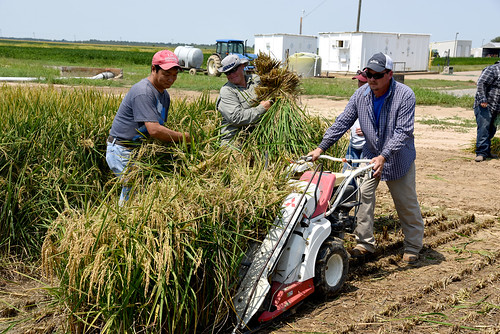Kellogg’s plans to contract Titan rice for some of its grain source
By Fred Miller
U of A System Division of Agriculture
@AgNews479
Fast Facts:
- Kellogg Company accepts Titan for cereal grain contracts
- Titan is a medium grain rice released in 2015 by Division of Agriculture
- Titan similar to Arkansas variety Jupiter, but with higher yield potential
(302 words)
Download related PHOTOS from Flickr: https://flic.kr/p/UBsaJV, https://flic.kr/p/2dNvz4r
VIDEO:Harvesting Titan foundation seed at the Rice Research and Extension Center: https://flic.kr/p/2aLisza
STUTTGART, Ark. — Kellogg Company announced in December that it will accept contracts of Titan rice for a portion of its 2019 volume of rice for cereal, said Bob Scott, director of the University of Arkansas System Division of Agriculture’s Rice Research and Extension Center.

Titan is a high-yield, very short-season, medium-grain rice variety released from the Division of Agriculture’s rice breeding program in 2015. It offers some improvements over Jupiter, an earlier release from Louisiana that is a favorite among producers who grow medium-grain rice for cereal markets.
Division rice breeder Xueyan Sha said Titan averaged 200 to 205 bushels per acre in performance trials, about 10 bushels higher than Jupiter.
Cereal chemistry is similar to Jupiter, Sha said, but grain size, dimensions and quality are improved. Its milling yield is 59 percent head rice, it has low chalkiness and grain color is whiter than Jupiter.
“The cereal industry and general export markets will find its grain characteristics and quality very desirable,” Sha said.
Titan matures four to six days earlier than Jupiter, Sha said. It’s a semidwarf plant similar in height to Jupiter, but Titan has improved resistance to lodging.
Titan has better resistance to leaf blast than Jupiter, Sha said. It is moderately susceptible to bacterial panicle blight.
Foundation seed for Titan has been available to seed growers and dealers since 2016. It has been widely available to rice producers since 2017.
Jarrod Hardke, extension rice agronomist for the Division of Agriculture, said Titan was grown on approximately 70,000 acres in Arkansas in 2018, which accounted for 40 percent of medium-grain acres. “It should maintain a similar market share or greater in 2019,” he said.
To learn more about Division of Agriculture rice breeding and research, visit the Arkansas Agricultural Experiment Station website: https://aaes.uark.edu. Follow us on Twitter at @ArkAgResearch.
About the Division of Agriculture
The University of Arkansas System Division of Agriculture’s mission is to strengthen agriculture, communities, and families by connecting trusted research to the adoption of best practices. Through the Agricultural Experiment Station and the Cooperative Extension Service, the Division of Agriculture conducts research and extension work within the nation’s historic land grant education system.
The Division of Agriculture is one of 20 entities within the University of Arkansas System. It has offices in all 75 counties in Arkansas and faculty on five system campuses.
Pursuant to 7 CFR § 15.3, the University of Arkansas System Division of Agriculture offers all its Extension and Research programs and services (including employment) without regard to race, color, sex, national origin, religion, age, disability, marital or veteran status, genetic information, sexual preference, pregnancy or any other legally protected status, and is an equal opportunity institution.
Media Contact: Fred Miller
U of A Division of Agriculture
Arkansas Agricultural Experiment Station
(479) 575-5647
fmiller@uark.edu
Related Links